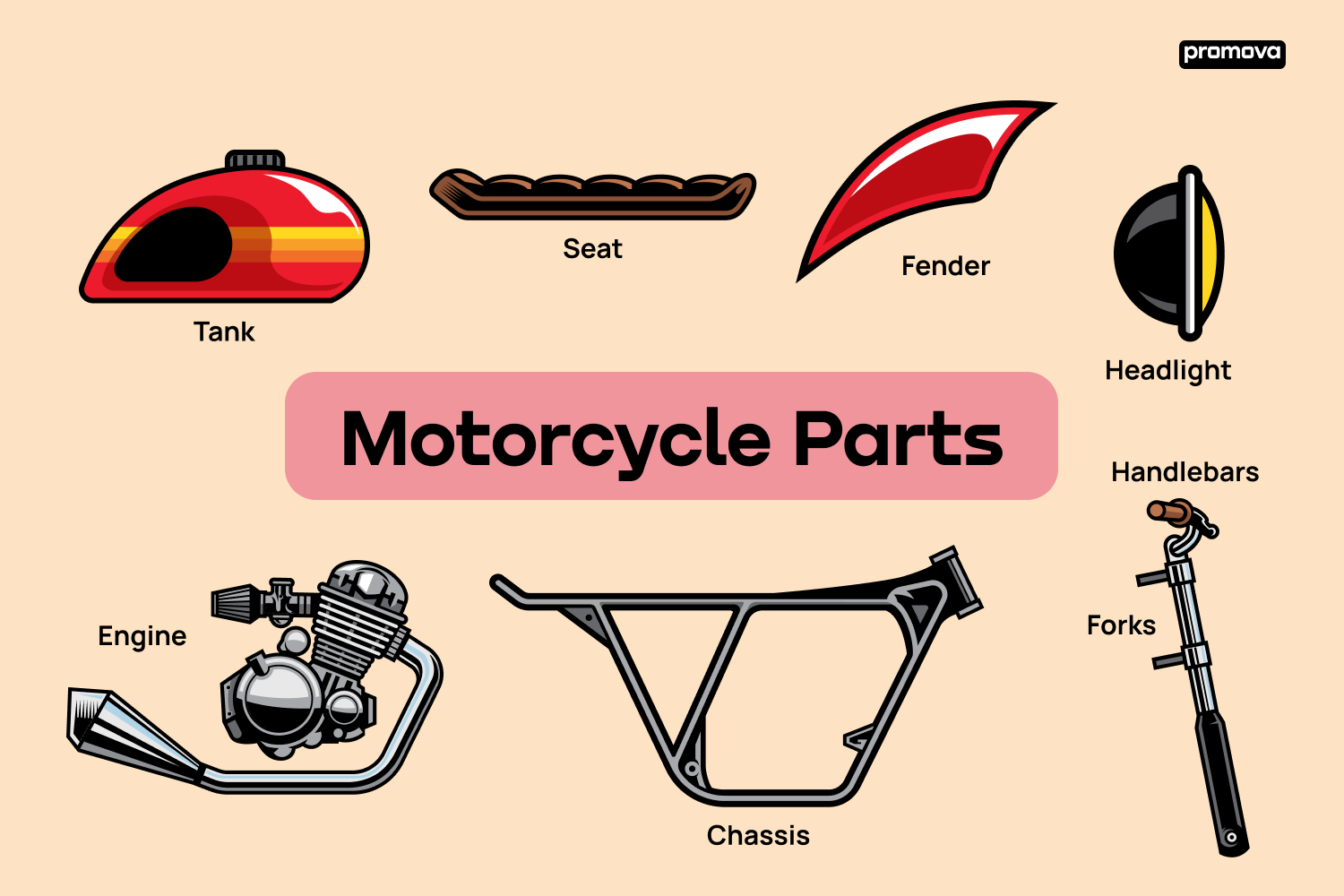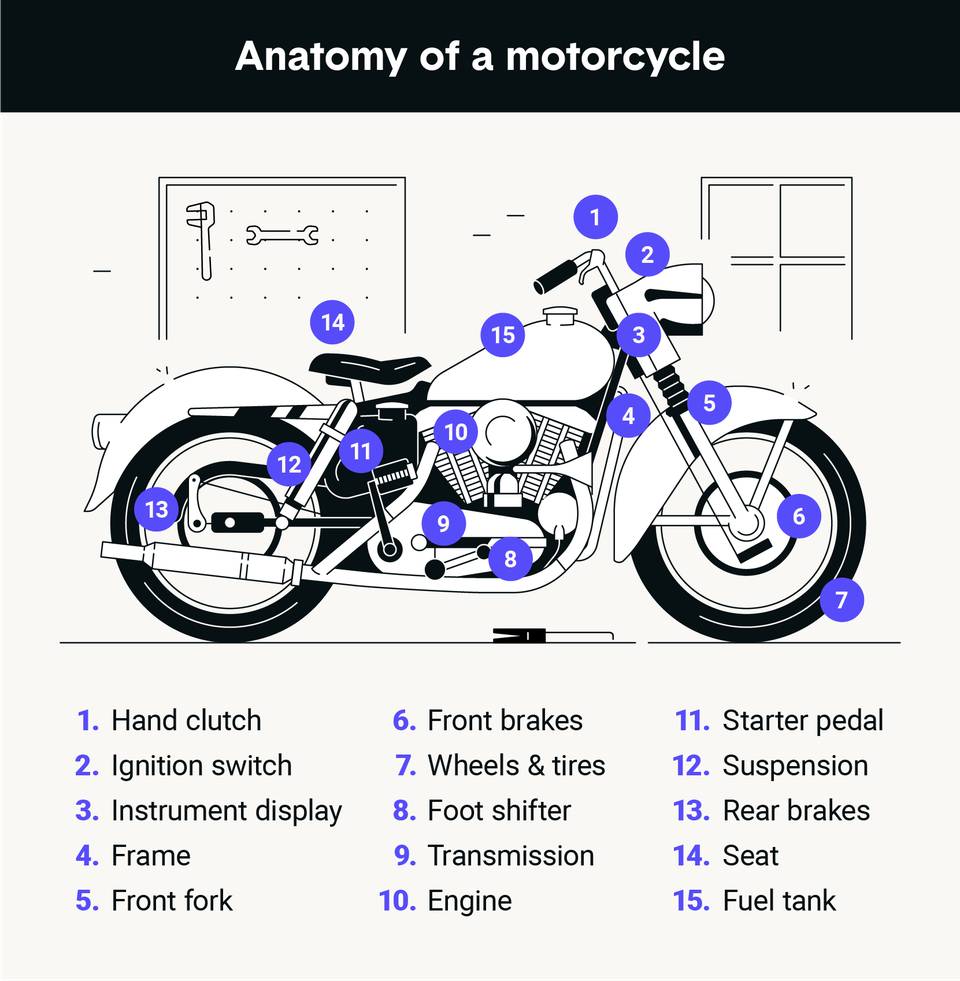Discover the Essential MotorBike Components You Need for Optimum Performance
Recognizing the crucial parts of a motorcycle is essential for attaining peak performance. Each component, from the engine to the braking system, plays a critical role in general functionality and security. Routine upkeep can protect against unexpected failures and enhance the riding experience. Many riders forget the intricacies of these systems. Finding exactly how they function with each other can bring about a more efficient trip. What vital parts should every cyclist prioritize?
The Engine: The Heart of Your Motorcycle
The engine functions as the core component of a motorcycle, driving its performance and specifying its capacities. It is accountable for transforming gas right into power, which powers the bike forward. Various kinds of engines are employed, including single-cylinder, V-twin, and inline setups, each offering distinctive features matched for various riding purposes and styles. The engine dimension, commonly gauged in cubic centimeters (cc), substantially affects efficiency, with larger engines typically offering more power and torque.Furthermore, the engine's layout and innovation, such as fuel injection systems or air-cooling versus liquid-cooling, influence performance and integrity. Maintenance is essential for peak procedure; variables like routine oil changes and checking ignition system guarantee longevity. Bikers typically think about an engine's responsiveness and smoothness, as these characteristics improve the overall riding experience. Inevitably, the engine stays a vital element that specifies not only the bike's efficiency but additionally the biker's connection to the maker.
The Transmission: Shifting Gears Efficiently
The transmission plays a vital role in a motorcycle's performance, particularly in the mechanics of gear changing. Recognizing exactly how to shift gears efficiently can boost the general riding experience, while regular upkeep warranties peak functionality. Correct interest to these facets can substantially affect the longevity and performance of the motorcycle.

Gear Shifting Mechanics
Smooth gear shifting is vital for ideal motorcycle efficiency, significantly influencing both acceleration and control. The mechanics of gear moving entail the interaction between the clutch, equipment bar, and transmission system. When a motorcyclist involves the clutch, it disengages the engine from the transmission, permitting an equipment adjustment without damaging the elements. A well-timed launch of the clutch, incorporated with accurate motion of the equipment bar, assists in a smooth change between gears. This procedure ensures that the engine runs within its ideal power band, enhancing performance. Motorcycle Parts Auckland. Furthermore, recognizing the equipment proportions and their effect on speed and torque can assist motorcyclists make educated selections throughout shifts, ultimately adding to a much more delightful and receptive riding experience
Upkeep Tips Importance
Routine maintenance plays a vital function in ensuring that the transmission system runs efficiently, enabling smooth gear shifts. Routinely examining and transforming the transmission liquid is essential, as old liquid can cause boosted rubbing and wear. Furthermore, checking the clutch for wear assurances peak interaction and disengagement, avoiding slippage during equipment adjustments. Lubrication of moving parts is equally vital to lower rubbing and enhance performance. Bike proprietors ought to also monitor for leakages and unusual noises, as these can show underlying problems. By adhering to these upkeep ideas, bikers can prolong the life-span of their transmission system, assuring that gear changes stay seamless and adding to the overall efficiency of their motorbike.
The Braking System: Ensuring Safety on Every Adventure
Braking systems are fundamental parts that directly affect a motorcycle's security and efficiency. They consist of various parts, consisting of brake pads, rotors, calipers, and hydraulic lines, all interacting to ensure reliable slowdown. The kind of braking system-- usually either disc or drum-- affects responsiveness and quiting power.Regular upkeep is necessary to support peak efficiency; worn brake pads can cause decreased efficiency and increased quiting ranges. Furthermore, the top quality of brake fluid need to be kept an eye on, as it can absorb dampness in time, endangering braking efficiency.Riders must additionally think about the relevance of anti-lock braking systems (ABDOMINAL), which protect against wheel lockup during sudden quits, enhancing general safety. Correctly operating brakes are not practically quiting; they instill confidence in the cyclist, permitting more secure navigation via various surfaces. Ultimately, a reputable stopping system is important for delighting in every ride with comfort.
The Suspension: Enhancing Convenience and Control
A well-functioning shock absorber greatly adds to a motorcycle's general efficiency, complementing the effectiveness of the braking system. The suspension plays a substantial duty in soaking up shocks from unequal surfaces, assuring a smoother experience while preserving tire contact with the roadway. This get in touch with is vital for both stability and control, allowing cyclists to browse corners with confidence and precision.Different kinds of shock absorber, such as telescopic forks or mono-shocks, use varying levels of convenience and handling. Effectively tuned suspension boosts responsiveness, offering the biker with a much more linked feeling to the motorcycle. Regular maintenance checks are necessary to identify the suspension parts, including springs and dampers, are working at their best. A reliable suspension system not just raises the riding experience but likewise adds to the long life of other motorcycle components by lessening wear and tear. Consequently, buying high quality suspension is important for any type of major motorcycle enthusiast.
The Tires: Linking You to the Roadway
Tires play an important duty in a motorcycle's efficiency, functioning as the primary link in between the biker and the roadway. Recognizing the different kinds of tires readily available can significantly influence taking care of and security. In addition, regular maintenance is crucial to assure peak tire performance and longevity.
Tire Enters Explained
Just how do various tire types influence a motorbike's efficiency? Tire kinds play an important role in establishing a motorcycle's grip, handling, and security. Sport tires, designed for high efficiency, deal boosted grip and responsiveness on paved roads, making them suitable for competing and aggressive riding. On the other hand, exploring tires prioritize longevity and comfort, offering a smoother experience for long-distance traveling. Off-road tires, defined by their rugged walk patterns, stand out in grip on unpaved surface areas, appropriate for experience lovers. Furthermore, dual-sport tires mix qualities from both off-road and on-road groups, dealing with functional riding demands. Inevitably, choosing the ideal tire type is vital for enhancing performance, guaranteeing safety, and enhancing the overall riding experience.
Upkeep Tips Offered
While riding on the roadway, preserving suitable tire condition is vital for safety and efficiency. On a regular basis inspecting tire stress is essential, as under-inflated tires can cause poor handling and increased wear. It is suggested to evaluate walk depth regularly; worn tires compromise grasp and stability. Furthermore, cyclists must search for signs of damages, such as bulges or splits, which can suggest the need for replacement. Turning tires periodically assures even put on, improving durability. Moreover, maintaining tires clean from debris and staying clear of excessive aesthetics can extend their life-span. Keeping proper positioning and equilibrium contributes to peak efficiency, decreasing tension on various other bike components. Following these maintenance pointers will significantly improve the total riding experience.
The Fuel System: Fueling Efficiency and Performance
The gas system plays an essential duty in maximizing a motorbike's efficiency and effectiveness, as it assures the optimum shipment of fuel to the engine. It consists of numerous crucial components, consisting of the gas tank, fuel pump, fuel filter, and fuel injectors or carburetor. Each component has to function properly to ensure a smooth and powerful ride.The fuel tank stores gasoline and supplies it to the engine through the fuel pump, which produces the needed stress. A gas filter protects against impurities from getting in the engine, while the injectors or carburetor mix gas with air for combustion.Proper upkeep of the gas system is critical; a blocked filter or malfunctioning injector can result in reduced performance and enhanced fuel consumption. By confirming that the fuel system operates efficiently, bikers can delight in enhanced throttle reaction, better fuel economy, and overall boosted riding experience.
The Electric System: Powering Your Experience
An effective electrical system is important for the overall capability and safety and security of a motorcycle, as it powers vital components such as the ignition, lighting, and numerous digital systems. This system includes the battery, which shops power, and the alternator, responsible for creating power while the engine runs. The wiring harness links these components, making sure reputable power distribution.Additionally, integrates shield the system from overloads, while relays aid manage high-current devices with low-power signals. A well-maintained electrical system boosts performance by guaranteeing smooth starts and regular procedure of lights and signals, essential for motorcyclist visibility and Read Full Article safety.Regular checks of the battery's cost and connections are essential for protecting against electrical failings. Bikers should likewise inspect electrical wiring for wear and tear, making sure all components work ideally. Eventually, a durable electrical system adds considerably to the general efficiency and reliability of the motorbike.
Regularly Asked Questions
Exactly how Typically Should I Change My Motorcycle's Battery?
The frequency of bike battery replacement depends upon use and maintenance (Motorcycle Spares Christchurch). Typically, batteries need to be replaced every three to five years. Routine checks can aid identify when a replacement is required for peak efficiency
What Tools Do I Need for Fundamental Motorbike Upkeep?
For standard motorcycle maintenance, one needs necessary devices such as a socket collection, wrenches, screwdrivers, pliers, tire stress scale, and a torque wrench. These devices help with efficient maintenance and assure the bike runs successfully and securely.
How Can I Improve My Motorbike's Aerodynamics?
To enhance motorbike aerodynamics, one ought to think about readjusting fairings, using windscreen extensions, optimizing body position, and decreasing general weight. These adjustments assist reduce drag, improving stability and fuel efficiency during rides.
What Are the Signs of a Failing Electrical System?
Signs of a failing electrical system consist of lowering lights, problem starting, irregular tool analyses, and blown merges. Motorcycle Parts Auckland. Unusual scents or deterioration around battery terminals may also indicate underlying concerns needing immediate interest for safety and efficiency

Exactly how Do I Select the Right Oil for My Motorbike?
When choosing oil for a motorcycle, one must think about the producer's specs, thickness ratings, and the sort of riding. In addition, synthetic versus conventional oil can impact efficiency and engine security, influencing the choice substantially. The engine dimension, usually measured in cubic centimeters (cc), substantially affects performance, with bigger engines typically providing even more power and torque.Furthermore, the engine's design and modern technology, such as gas injection systems or air-cooling versus liquid-cooling, influence effectiveness and reliability. A well-functioning suspension system substantially contributes to a motorcycle's general performance, enhancing the efficiency of the braking system. The Find Out More gas system plays a crucial role in optimizing a motorbike's efficiency and efficiency, as it ensures the optimal shipment of fuel to the engine. A gas filter stops pollutants from going into the engine, while the injectors or carburetor mix gas with air for combustion.Proper upkeep of the fuel system is important; a clogged up filter or malfunctioning injector can lead to reduced performance and raised gas consumption. A here properly maintained electric system enhances efficiency by guaranteeing smooth begins and regular operation of signals and lights, essential for biker exposure and safety.Regular checks of the battery's fee and connections are important for preventing electric failures.
Comments on “Step-by-Step Guide to Assembling Basic Motorbike Components NZ”